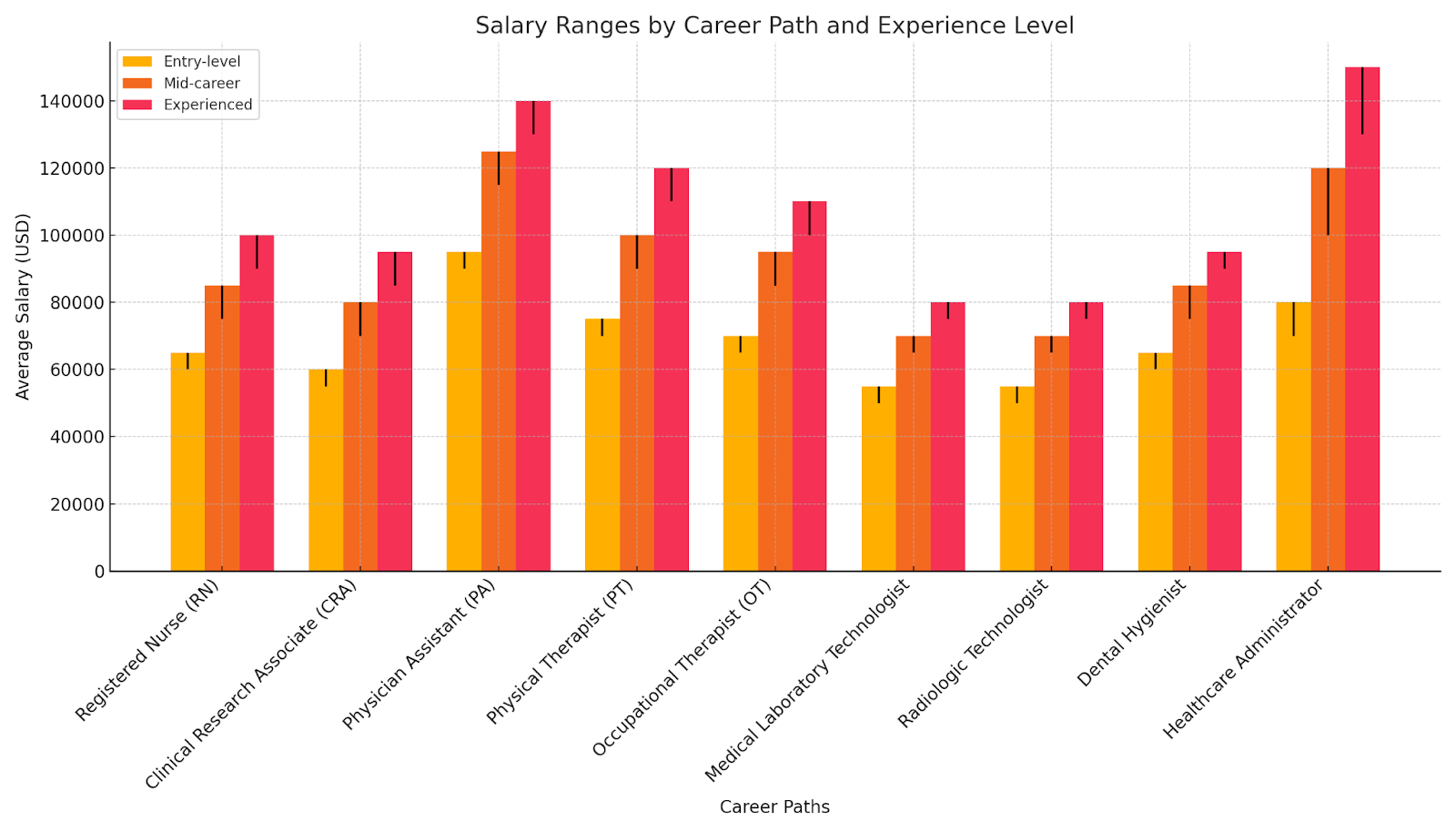Comments
- No comments found

The field of healthcare offers a myriad of rewarding career opportunities.
While many immediately think of nursing as a noble and impactful path, it's important to shine a light on other significant roles that also contribute to the well-being of patients and the advancement of medical science. In this article, we'll delve deep into some of the best healthcare careers that don't require an MD, each offering unique opportunities for growth, impact, certification, and personal fulfillment. Let’s dive in!

Registered Nurses (RNs) are the backbone of the healthcare system, and definitely one of the best healthcare career options out there. The career progression for an RN typically starts with earning an Associate's Degree in Nursing (ADN) or a Bachelor of Science in Nursing (BSN). RNs can advance to become Nurse Managers, Nurse Educators, or even Nurse Practitioners with additional education and experience.
Administer medications, treatments, and therapies.
Monitor patient health, record symptoms, and progress.
Conduct physical exams, take detailed health histories, and assess patients' needs.
Work with healthcare teams to develop and implement patient care plans.
Coordinate care among various healthcare professionals.
Teach patients and families about health conditions, treatment plans, and wellness strategies.
Provide discharge instructions.
Maintain accurate patient records, chart changes, and document all interactions and care provided.
Advocate for patients' health and wellbeing, ensuring they receive appropriate care and support.
Associate's Degree in Nursing (ADN) or Bachelor of Science in Nursing (BSN).
Passing the NCLEX-RN exam to obtain licensure.
The American Nurses Credentialing Center (ANCC) provides a wide range of specialty certifications for nurses.
The American Association of Critical-Care Nurses (AACN) offers certifications like CCRN, along with study resources and review courses.
The National Council of State Boards of Nursing (NCSBN) provides information on the NCLEX-RN exam, including practice tests and study materials.
Job growth in the US: 9% from 2020 to 2030 (Bureau of Labor Statistics).
Average salary in the US: $75,000 - $80,000 annually; in Canada: CAD 70,000 - CAD 75,000 annually.
Entry-level: $60,000 - $65,000.
Mid-career: $75,000 - $85,000.
Experienced: $90,000 - $100,000.
Clinical Research Associates play a pivotal role in clinical trials, ensuring studies are conducted ethically and data is collected accurately. The career path often starts with a Bachelor's degree in life sciences, progressing to senior CRA roles, clinical project management, or higher positions in regulatory affairs or clinical operations.
Regularly visit clinical trial sites to ensure compliance with protocols, regulations, and guidelines.
Monitor trial progress and data collection.
Review data entries and ensure accuracy and completeness.
Verify that source data matches data entered into the trial databases.
Ensure trials adhere to regulatory requirements, including Good Clinical Practice (GCP) guidelines.
Prepare and submit detailed reports on trial progress, findings, and any issues that arise during the study.
Train site staff on study protocols, proper data collection, and reporting procedures.
Address any issues or discrepancies found during site visits and audits, working with site staff to resolve them.
The Society of Clinical Research Associates (SOCRA) offers certification exams (CCRP) and prep courses, while study guides and exam prep materials are available online.
The Association of Clinical Research Professionals (ACRP) provides certification exams (CCRC), online courses, and resources for professional development.
The Clinical and Translational Science Institute (CTSI) often provides training programs and resources for clinical research professionals.
Job growth in the US: Projected 6% from 2020 to 2030.
Average salary in the US: $70,000 - $75,000 annually; in Canada: CAD 65,000 - CAD 70,000 annually.
Entry-level: $55,000 - $60,000.
Mid-career: $70,000 - $80,000.
Experienced: $85,000 - $95,000.
Physician Assistant is also one of the best healthcare careers that surprisingly doesn't require an MD. PAs provide healthcare services under the supervision of physicians. Starting with a Master's degree in Physician Assistant Studies, PAs can specialize in areas such as surgery, emergency medicine, or pediatrics, often moving into leadership or education roles.
Conduct physical exams, take medical histories, and evaluate patient symptoms.
Diagnose illnesses and injuries, interpret diagnostic tests, and develop treatment plans.
Prescribe medications, administer treatments, and perform minor procedures.
Educate patients on their conditions, treatment options, preventive care, and healthy lifestyle choices.
Monitor patient progress, adjust treatment plans as needed, and coordinate with other healthcare providers.
Assist in surgeries and procedures, providing support to the surgical team and ensuring patient safety.
Master's degree in Physician Assistant Studies.
Passing the Physician Assistant National Certifying Exam (PANCE).
The National Commission on Certification of Physician Assistants (NCCPA) provides information on the PANCE and PANRE exams, CME requirements, and study resources.
The American Academy of PAs (AAPA) offers continuing education, professional development resources, and networking opportunities.
The Physician Assistant Education Association (PAEA) provides educational resources, research, and support for PA programs and professionals.
Job growth in the US: 31% from 2020 to 2030.
Average salary in the US: $115,000 - $120,000 annually; in Canada: CAD 105,000 - CAD 110,000 annually.
Entry-level: $90,000 - $95,000.
Mid-career: $115,000 - $125,000.
Experienced: $130,000 - $140,000.
Physical Therapists help patients improve mobility and manage pain through therapeutic exercises and treatments, and can be very rewarding in terms of career satisfaction. This makes it one of the best healthcare career choices. A Doctorate in Physical Therapy (DPT) is required, with career paths leading to specializations in sports, geriatrics, or pediatrics, and potential roles in management or private practice.
Evaluate patients' physical conditions and functional abilities.
Develop individualized treatment plans.
Guide patients through exercises and physical activities designed to improve mobility, strength, and function.
Use techniques such as massage, heat/cold therapy, ultrasound, and electrical stimulation to manage pain and inflammation.
Teach patients how to perform exercises at home, use assistive devices, and prevent further injury.
Keep detailed records of patient progress, treatments provided, and any changes in the treatment plan.
Work with other healthcare professionals to ensure comprehensive patient care.
Doctorate in Physical Therapy (DPT).
Passing the National Physical Therapy Examination (NPTE).
The American Physical Therapy Association (APTA) provides information on certification, continuing education courses, and professional development resources.
The Federation of State Boards of Physical Therapy (FSBPT) offers the NPTE exam, practice tests, and study guides.
Specialist Certification Programs are available through ABPTS, offering certifications in various specialties such as orthopedics, sports, and geriatrics.
Job growth in the US: 21% from 2020 to 2030.
Average salary in the US: $90,000 - $95,000 annually; in Canada: CAD 80,000 - CAD 85,000 annually.
Entry-level: $70,000 - $75,000.
Mid-career: $90,000 - $100,000.
Experienced: $110,000 - $120,000.
Occupational Therapists assist patients in developing or regaining daily living and work skills. With a Master's or Doctoral degree in Occupational Therapy, OTs can specialize in pediatrics, geriatrics, or mental health, advancing to roles in administration or academia.
Evaluate patients' physical, mental, and emotional abilities. Assess their ability to perform daily activities.
Develop customized treatment plans to help patients achieve their goals and improve their quality of life.
Teach patients how to perform tasks such as dressing, eating, and using adaptive equipment.
Recommend changes to patients' environments to enhance their independence and safety.
Use activities and exercises to improve patients' motor skills, cognitive function, and sensory processing.
Provide education and support to patients' families and caregivers to facilitate ongoing care.
Master's or Doctoral degree in Occupational Therapy.
Passing the National Board for Certification in Occupational Therapy (NBCOT) exam.
The American Occupational Therapy Association (AOTA) provides certification information, continuing education resources, and professional development opportunities.
The National Board for Certification in Occupational Therapy (NBCOT) offers the certification exam, practice tests, and study materials.
Specialty Certification Programs are available through NBCOT, offering advanced certifications in areas like pediatrics, mental health, and physical rehabilitation.
Job growth in the US: 17% from 2020 to 2030.
Average salary in the US: $85,000 - $90,000 annually; in Canada: CAD 75,000 - CAD 80,000 annually.
Entry-level: $65,000 - $70,000.
Mid-career: $85,000 - $95,000.
Experienced: $100,000 - $110,000.
Medical Laboratory Technologists perform essential lab tests that aid in the diagnosis and treatment of diseases. This is one of the best healthcare careers for someone who enjoys technical work. Starting with a Bachelor's degree in Medical Technology, technologists can advance to supervisory roles, specialize in areas like microbiology or hematology, or move into research and development.
Perform tests on blood, tissues, and other bodily fluids to detect diseases and conditions.
Operate and maintain sophisticated laboratory equipment and instruments.
Ensure the accuracy and reliability of test results through rigorous quality control procedures.
Analyze and interpret test results, providing critical information for diagnosing and treating patients.
Document and report test findings to physicians and other healthcare providers.
Follow strict safety protocols to prevent contamination and ensure a safe laboratory environment.
Bachelor's degree in Medical Technology or Clinical Laboratory Science.
Certification through organizations like the American Society for Clinical Pathology (ASCP).
The American Society for Clinical Pathology (ASCP) offers certification exams, study guides, and continuing education resources.
The American Medical Technologists (AMT) provides certification, continuing education, and professional development opportunities for medical technologists.
The Clinical Laboratory Improvement Amendments (CLIA) provides information on regulatory requirements and standards for laboratory testing.
Job growth in the US: 11% from 2020 to 2030.
Average salary in the US: $60,000 - $65,000 annually; in Canada: CAD 55,000 - CAD 60,000 annually.
Entry-level: $50,000 - $55,000.
Mid-career: $65,000 - $70,000.
Experienced: $75,000 - $80,000.
Radiologic Technologists perform diagnostic imaging examinations such as X-rays, MRIs, and CT scans. With an Associate's or Bachelor's degree in Radiologic Technology, technologists can specialize in modalities like mammography or interventional radiology, advancing to senior technologist or management positions.
Operating imaging equipment to capture images of patients' internal structures.
Preparing patients for procedures and ensuring their comfort.
Maintaining accurate patient records.
Adhering to safety protocols to minimize radiation exposure.
Associate's or Bachelor's degree in Radiologic Technology.
Passing the American Registry of Radiologic Technologists (ARRT) certification exam.
The American Registry of Radiologic Technologists (ARRT) provides certification exams, continuing education resources, and professional development opportunities.
The American Society of Radiologic Technologists (ASRT) offers educational programs, certification information, and resources for radiologic technologists.
The Radiological Society of North America (RSNA) provides continuing education, research, and networking opportunities for imaging professionals.
Job growth in the US: 9% from 2020 to 2030.
Average salary in the US: $60,000 - $65,000 annually; in Canada: CAD 55,000 - CAD 60,000 annually.
Entry-level: $50,000 - $55,000.
Mid-career: $65,000 - $70,000.
Experienced: $75,000 - $80,000.
Dental Hygienists play a crucial role in oral healthcare, focusing on preventive care and patient education. Starting with an Associate's or Bachelor's degree in Dental Hygiene, hygienists can advance to roles in education, research, or dental office management.
Clean and polish patients' teeth, removing plaque, tartar, and stains.
Conduct preliminary oral examinations, checking for signs of oral diseases such as gingivitis and cavities.
Apply fluoride treatments and dental sealants to protect teeth from decay.
Take and develop dental X-rays to assist in diagnosis and treatment planning.
Educate patients on proper oral hygiene techniques, including brushing, flossing, and dietary recommendations.
Document patient care, treatment plans, and progress notes in dental records.
Associate's or Bachelor's degree in Dental Hygiene.
Passing the National Board Dental Hygiene Examination (NBDHE).
The American Dental Hygienists' Association (ADHA) provides information on licensure, continuing education resources, and professional development opportunities.
The Joint Commission on National Dental Examinations (JCNDE) offers the NBDHE and resources for exam preparation.
The State Dental Boards provide specific licensure requirements and resources for dental hygienists in each state.
Job growth in the US: 11% from 2020 to 2030.
Average salary in the US: $75,000 - $80,000 annually; in Canada: CAD 70,000 - CAD 75,000 annually.
Entry-level: $60,000 - $65,000.
Mid-career: $75,000 - $85,000.
Experienced: $90,000 - $95,000.
Healthcare Administrators manage healthcare facilities, ensuring efficient operation and quality patient care. Starting with a Bachelor's or Master's degree in Healthcare Administration, professionals can move into higher management roles, including hospital CEO or healthcare consultant.
Oversee the day-to-day operations of healthcare facilities, including hospitals, clinics, and nursing homes.
Manage and supervise healthcare staff, ensuring efficient and effective operations.
Develop and manage facility budgets, controlling costs while maintaining high-quality care.
Ensure the facility complies with healthcare regulations and standards.
Develop and implement policies and procedures to improve patient care and operational efficiency.
Plan and coordinate health services, set goals, and develop strategies for growth and improvement.
The American College of Healthcare Executives (ACHE) provides certification exams, continuing education resources, and professional development opportunities.
The Healthcare Financial Management Association (HFMA) offers certifications in healthcare finance and management.
The National Association of Long-Term Care Administrator Boards (NAB) provides licensure and certification information for administrators in long-term care facilities.
Job growth in the US: 32% from 2020 to 2030.
Average salary in the US: $100,000 - $110,000 annually; in Canada: CAD 90,000 - CAD 100,000 annually.
Average Salary by Experience
Entry-level: $70,000 - $80,000.
Mid-career: $100,000 - $120,000.
Experienced: $130,000 - $150,000.
So as you can see, the healthcare industry offers diverse career opportunities with varying levels of education and certification requirements. Here are some key points about the best healthcare careers that don’t require an MD:


Overall, while nursing is a great career, you should still be aware of the other options available to you. Whether you're looking for rapid entry into the workforce or aiming for advanced roles with higher earning potential, there's a healthcare career to match your aspirations!
Leave your comments
Post comment as a guest